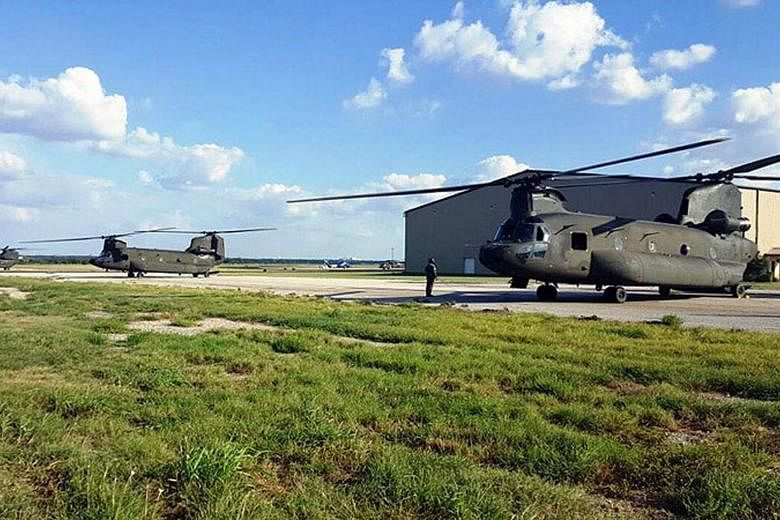WASHINGTON (WASHINGTON POST) - In the wake of Hurricane Katrina, more than 150 countries offered volunteers, supplies and cash to the United States.
Impoverished Bangladesh, suffering a not-so-slow-motion climate catastrophe, promised US$1 million and rescuers. Thailand offered 60 doctors and rice as a "gesture from the heart." Germany sent high-speed pumps; the Dutch offered levee reconstruction experts.
"Very large cash" donations came from Kuwait, Qatar and the United Arab Emirates. Canada sent navy ships, helicopters and about 1,000 helpers.
Mexico's convoy of soldiers, all-terrain rescue vehicles and drinking water was followed by food, medical workers, water-treatment facilities and a kitchen that could feed 7,000 people daily.
After Harvey?
Not crickets exactly, but close. Few countries have publicly offered aid.
The European Union sent satellites. Singapore despatched four Chinook helicopters. In a statement, Mexico offered "help and coordination" to Harvey-ravaged Texas, though they didn't go into specifics.
It's worth noting, too, that that same statement responded forcefully to a Twitter diatribe from President Trump, who once again demanded that Mexico pay for a border wall and threatened to "terminate" Nafta. (The State Department has not said whether it will accept aid from Mexico. In a statement, it said "if a need for assistance does arise, we will work with our partners, including Mexico, to determine the best way forward.")
Canadians are shipping supplies like baby bottles, formula and bath towels. Taiwan reportedly offered US$800,000, and Venezuela promised US$5 million. It's unclear whether that funding would be accepted.
At a White House briefing, spokesman Thomas Bossert said that Mexican and Canadian leaders have called the president, but they didn't discuss how those countries might help. "The president didn't get into the specifics, and neither did the heads of state calling. So I think their primary purpose was to express and extend their prayers and their thoughts and their condolences to those that lost their lives," he said.
Bossert also noted that the White House would turn over to FEMA and the State Department any "actual concrete" offers. FEMA did not return a request for comment. State directed questions to FEMA.
It's possible that more offers of aid are forthcoming, and that countries are simply waiting to see how things play out. But Markos Kounalakis, a professor at Central European University, has a different theory about what's going on.
"Maybe a distracted State Department experiencing attrition is unable to process foreign offers and aid. But it might also be that Trump actively alienates American friends and allies, boasts he is cutting USAID, and makes clear that America First translates into an aid policy of every nation for itself," he wrote in an op-ed in the Miami Herald.
"Countries seeking political payback, or simply eager to make a point, by sitting silent is a conceivable, if cruel, reaction to a White House that has been deliberately self-centred and dangerously provocative."
There's another possibility, too.
The United States struggled to make use of the foreign aid donated after Katrina. According to a 2011 Heritage Foundation report, just US$115 million of the $850 million offered in Katrina relief was used. About US$400 million of oil aid sat untouched.
There were other snafus, too. Britain donated 400,000 ready-to-eat meals. But some contained beef, banned at the time because of fears of mad cow disease. So the food sat in a factory in Arkansas.
At one point, the State Department suggested that countries funnel their donations directly to organisations like the Red Cross, where they'd be put to better use.
At the time, the Bush administration explained things this way.
"There is a process of matching needs with expertise and the donations that have been made," State Department spokesman Sean McCormack explained to the Associated Press. Decisions about what to accept are based on need, he said, not politics. Germany's high-speed pumps, for example, were eagerly accepted. Cuba's offer of 1,100 doctors, not so much.
But in their review of the Katrina response, the administration noted that they needed a plan to manage donations and inquiries. "The Department of State, in coordination with the Department of Homeland Security, should review and revise policies, plans, and procedures for the management of foreign disaster assistance," the report read.
In 2010, the United States had a chance to prove that it had learned its lesson. That year, the Deepwater Horizon rig exploded in the Gulf of Mexico, creating the largest oil spill in American history. At least 30 countries reached out to offer aid. Sweden, for example, offered to provide specialised equipment designed to clean up oil spills. Their offer went unanswered.
Eventually, the Obama administration took some countries up on their offers. Mexico sent skimmers; the Dutch offered machines that attached to ships to suck up oil. But the US government largely relied on BP to decide what it needed.
Even Secretary of State Hillary Clinton was frustrated by the administration's response to aid offers.
"The US remains ill-prepared to accept offers of foreign aid and put them to use in a way that will save lives and property," the Heritage report found. "US officials are taking inadequate advantage of the assets available from the international community."

